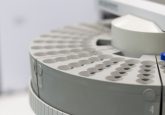Development of blood monitoring technology that could measure lactate levels in patients experiencing shock

In most patients with life-threatening shock, blood lactate or lactic acid levels are routinely measured as these are often pronounced in cases of shock, heart failure and dangerous infections. The levels of lactate in blood could act as a marker in assessing response to therapy and guiding treatment in patients.
There is an increasing demand for continuous and non-invasive monitoring of blood lactate or lactic acid in blood, as currently available methods are invasive, time consuming, and inhibit the continuous monitoring of this critical care marker.
With funding from the Engineering and Physical Sciences Research Council, Panicos Kyriacou (City, University of London, UK) hopesto design and develop a new non-invasive optical sensor for continuous monitoring of lactate in blood, using multi-parametric spectroscopic analysis technology, in combination with multivariate modeling.
Being one of the most frequently diagnosed conditions in intensive care unit patients, shock poses a significant challenge to global healthcare, including the UK’s National Health Service. The project aims to assimilate new knowledge that could impact the UK medical and biomedical engineering fields. This research could also directly impact the timeliness of subsequent interventions, minimize harm to the patients and save on cost to healthcare services.





